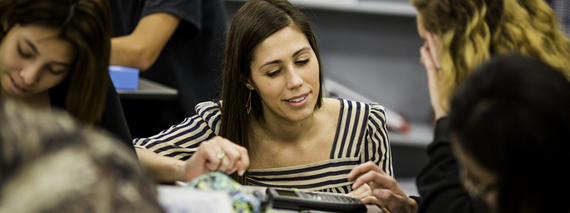Kelly Zunkiewicz is a 2014 Fishman Prize winner and Pre-Calculus and AP Calculus teacher in Hillsborough County, Florida. We were struck by Kelly’s hunger to find new strategies for her classroom, so we asked her to reflect on some of the great teachers she’s learned from.
My first year as a teacher, I worked tirelessly to collect every single homework assignment I gave my students. I thought doing so would provide me with useful data to drive my lessons.
I also thought collecting homework was what good teachers did.
But every day, the stack of un-graded work piled higher and higher on my desk, until I was drowning in it. One evening, as I was nodding off at my desk while attempting to grade a week-old heap, I had a crucial realization: I was asking my students to complete homework assignments I didn’t have time to address in class, let alone grade. I was doing more harm than good.
I knew students should benefit from the extra practice and remediation homework provides. I knew I should be providing feedback to my students. And I knew I should be getting data to drive lessons. But none of that was happening with my current homework system.
So I resorted to a tactic that I would later come to understand is the real secret of great teaching: I reached out to a teacher who knew more than I did.
Diana Wohlgamuth—friend, mentor, experienced math teacher and current math coach—came to my rescue by sharing her ingenious homework calendar.
Here’s how it works: Diana gives her students a blank calendar every quarter, printed on a brightly colored piece of paper. Every day she quickly circulates the classroom (in under five minutes!), spot-checking homework and giving each student a grade between 0 and 4 on that day on the calendar.
I implemented the homework calendar in my classroom and noticed a distinct change right away. My students’ homework completion went up dramatically: They knew I would be looking at their work within the first few minutes of class, and that they would have to face my disappointment if it was not completed. I was able to spot-check their work, looking for specific steps, vocabulary or responses that would inform what I would focus on in class. Now, every Friday, I collect the calendars, enter a single weekly homework grade for each student, and give students a stamp if they’ve completed all their assignments. (They may be high schoolers, but they still love that stamp!)
Eventually, I adapted the homework calendar to an entire streamlined process that begins with students recognizing their own questions. Before the bell rings, my students hustle into the classroom, pull out their red editing pens and begin working with their teammates to compare and edit their homework. Any questions they still have after talking with one another go under a “Homework” section on our class whiteboard. When class starts, I take a quick glance at the board and identify common problem areas. At the very beginning of class, I already know what students struggled with from the day before.
Meanwhile, I circulate the room, just as Diana taught me. The students are already working on their Do Now assignment, but they leave their homework and calendar out, ready for inspection. This process allows me to speak with each student and ask specific content questions, flash a smile or simply ask how the volleyball game went last night. And because I look at their homework and answer their questions every day, I can hold my students accountable for getting their work done on time.
My students now know the morning routine and understand the value of identifying their own areas of weakness. They’re responsible for being prepared for this routine every day, with their homework calendar ready in their binder, and I’ve found that all my students—from freshman to seniors—can handle the responsibility. The calendar, which they can take home and show their families, also helps their loved ones get a sense week to week of how their student is doing. Parents can check for that stamp that lets them know that their child is completing all their assignments, or they can look online at the weekly homework grades that, thanks to the calendar system, are now always up to date.
As a new teacher, I didn’t realize just how much borrowing Diana’s homework calendar and tweaking it to make it my own would change my teaching practice. Now, I’ve seen the process not only save me time and streamline my grading, but also bring organization and direction to the beginning of my classes. Mostly importantly, it helps me connect quickly with every student in the room—and I believe teacher-student relationships are the foundation of great teaching and learning, as I wrote about in this year’s collection of Fishman Prize essays.
Diana’s guidance, like so many other mentor teachers’, proves the tremendous value of asking our colleagues for help. Great teachers aren’t born—we learn our craft from others who came before us. I’m thankful for Diana, and for all the other great teachers I’ve learned from.
Who are the great teachers you’ve learned from? This Thanksgiving, thank them by nominating them for our $25,000 Fishman Prize for Superlative Classroom Practice (or apply online yourself!).
